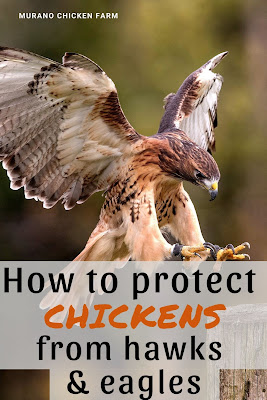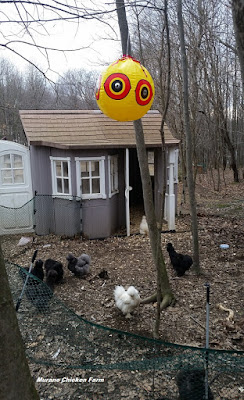That is one of the main dangers of allowing the chickens to free range...predators. We've talked about predators before as I've had problems in the past with everything from bears to snakes and raccoons.
Sometimes it seems like everything eats chickens *sigh* even other birds! Birds of prey fall into this category and unfortunately if you live anywhere outside city limits you're bound to run into them eventually.
The most common bird of prey you'll see when keeping chickens is the Red-tailed hawk, followed by the Cooper's hawk. Bald and golden eagles are behind them with owls bringing up the rear of the list.
Owls are less of a problem because the majority of them hunt after dark and most people have their chickens locked up in their coop by then.
A Cooper's hawk is kind of on the small side, so if you only raise large breed chickens and keep juveniles protected till they are full sized, they shouldn't be a problem for you.However if you place bird feeders out for wild birds they could attract Cooper's hawks which feed on the smaller wild birds.
Remember, birds of prey are very opportunistic. They may prefer to hunt a certain type of animal, but they will take anything that's easy to get. Especially when other prey is scarce, like in winter!
We want to make our chickens as difficult as possible for a hawk to grab.
A hawk plays a big part in my worst year keeping chickens ever! Also I'm actually shocked at this picture I managed to take of my guinea fowl in 2015 when a hawk was apparently scared off by my sudden appearance! Pretty sure that's a red tailed hawk in the upper left corner!
Keeping chickens safe from hawks
If possible, it's safest to let your chickens spend their time outside in a covered run with welded wire sides. If you can't put up a solid roof, then deer netting can help to deter hawks and eagles.
If that's not possible (I get it, one of my runs has trees growing in it!) then try to be outside with them as much as possible during free range time.
There are a few other things you can do to help deter hawks and keep your chickens safe even when you can't be there.
Hawk deterrents for chickens
Keep a rooster in the flock
One of the roosters jobs is to protect his flock. This comes in many forms, from warning them to hide when he senses danger to attacking a predator that's going after one of his hens.
When he senses danger the rooster will start making noises that tells the girls to hide. If they can get into the coop, under some dense foliage or some other protected area the hawk will eventually leave to find easier hunting.
I've also seen a rooster attack a hawk! One afternoon I heard the guinea fowl start making noise and ran outside just in time to see a hawk land on the back of a little silkie hen.
He tried to fly away but she started to slip from his grasp and he went back down to the ground when my Marans rooster launched himself at the hawk, spurs out!
He hit the hawk right on it's back, who dropped the silkie and flew off into the trees. A good rooster is definitely worth his weight in gold!
Raise guinea fowl
Guinea fowl are horribly noisy and often start screaming about the dumbest things, but many times the things they scream about really are worth the noise!
When chickens live with guineas they start to learn their noises and whenever my guineas start to go off about something bad, the chickens run for cover.
Sometimes it's a hawk, other times the wind blew a broom over. Either way the chickens hide and are safe from brooms and hawks alike! lol
Livestock guard dog
A guard dog is good to have around your chickens and they will often chase away hawks while they're still in the air! Our dog Lulu used to run across the yard barking up at any hawk that dared to hunt her yard!
Hawks and eagles will soar over your yard looking for easy prey. When they see something that looks edible, they will find a perch and watch for the perfect opportunity to swoop down and attack.
Many guard dogs (mine included) will run under the hawk while it's flying barking at it. This is often enough to keep the hawk from actively hunting there.
Provide hiding places
Many people have trees near their coops and might think that makes a safe spot for chickens to hide. Unfortunately hawks were built to hunt in the woods, so tall trees offer very little shelter for chickens.
What does offer a good hiding place for them is underneath pine trees, big rhododendron bushes, a few clumps of zebra grass planted together or even a low structure they can get under.
You want to provide an area that the chickens can fit, but that a hawk wouldn't have enough room to maneuver if he tried to get one of the chickens.Distractions: shiny and hanging things
Reflective tape, old CDs and scare balls are just a few things that people use to visually distract and confuse birds of prey.
Some people like to string fishing line across free range areas to confuse raptors. It could make them feel unsafe about hunting in the area since they can sort of see it, but not quite figure out what it is.
I have the scare balls hanging above my silkie run since I can't put a roof on it and they work for me.
Some people use those big plastic owl statues to chase away hawks, but I haven't tried those. If you do get one, you'll have to move it often to keep the hawks confused. If you don't move it they'll get used to it being in the same spot and realize it's not a threat.You can also use an old fashioned scarecrow, but again the hawks will get used to it after awhile.
Attract the crows
Crows like peanuts and hate hawks. They will relentlessly harass a hawk as they recognize that a hawk is a bird of prey and they will defend their territory from the hawk. They are very vocal about it too!
If I hear the crows frantically squawking I almost always see a hawk when I go outside. I throw peanuts out for the crows and they keep coming back.
Since crows are omnivores it's understandable to consider the safety of chicks or eggs around them. I have been looking for proof that crows will attack chicks or steal eggs for several years and I haven't found any!
I know they like eggs and when I put the really dirty duck eggs in the woods for them they do eat them. They seem to prefer them boiled which is interesting.
Anyway, I've never seen crows in the coops. I've never been missing eggs and have never found anyone with first hand experience of crows bothering chickens. I'm listing this here because it works for me.
One small trick birders use: when hawks start hanging around their feeders they remove the feeders for a week or two and the wild birds go away. The hawks leave since the small birds are gone.
Then they return the feeders and the wild birds return but the hawks have usually moved on at this point.
If you have a hawk problem, by keeping your birds inside their coop for a week or so the hawk will often move on to easier hunting grounds.
Obviously the safest route is to keep your chickens in an enclosed run or be outside with them whenever they are. I can't always do that and I know a lot of people are in the same boat.If you choose to free range then one or all of these deterrents may help your chickens to avoid the local raptors.
~L
Want to know more about raising chickens? Check out Does your coop run need a roof?!
Want information on raising chickens sent right to your email weekly? Click right here to join my list and get new posts sent directly to you the day they're published ... plus, you'll also get 4 free downloadable cheat sheets including '25 Ways to save money raising chickens'.
This post contains affiliate links. If you chose to purchase something through the link, I will get a small payment from Amazon. It will not affect your purchase price. Click for full disclosure.






No comments:
Post a Comment